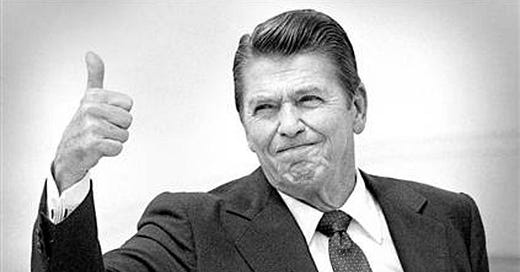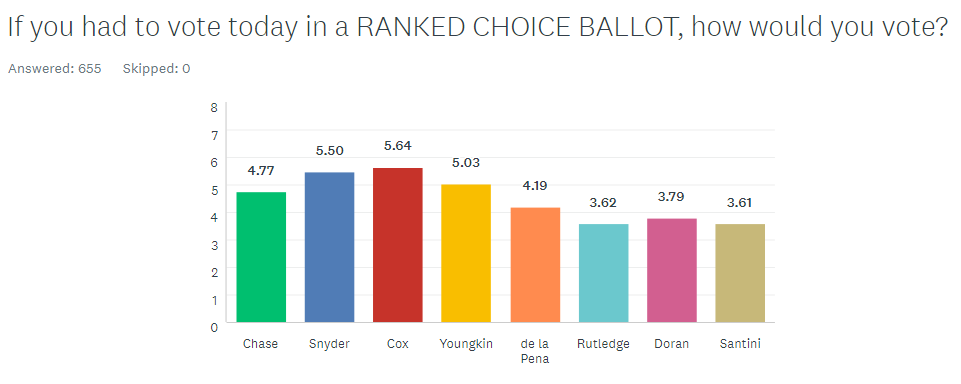POLL: Cox, Snyder TIED In Ranked Choice Convention Contest; Youngkin 3rd
Primary Results? Chase 39% Snyder 24%, Cox 23%... with Youngkin in a distant fourth place at 8%.
Our TRS Virginia Republican gubernatorial contest poll from February 15-17 is done and the results from 655 online respondents are in.
In a statistical dead heat, former Speaker Kirk Cox (R-Colonial Heights) slightly edges out Disruptor Capital CEO Pete Snyder in a statistically insignificant margin given the multi-candidate field — effectively making the race too close to call.
Meanwhile, former Carlyle Group CEO Glenn Youngkin — a relative newcomer to Virginia politics — ranks distantly behind the two frontrunners at third place, with State Senator Amanda Chase (I-Chesterfield) ranking a distant fourth near former Trump Defense Dep. Asst. Secretary Sergio de la Pena at 5th place.
The results of the ranked choice balloting are here:
There’s a wrinkle to this, of course.
If the election were a primary, the numbers are much different. In a primary contest, Chase disposes of the field handily with 39.24% of the vote, with Snyder at 23.82% and Cox at 23.21% — effectively splitting the conservative vote. Youngkin comes in at 8.55% with the rest of the field in single digits.
So that is a lot to digest. Before folks start going fake poll or flawed poll because of the results, let’s go into how you get ranked choice balloting in the first place and why favorables and unfavorables matter (a lot).
First let’s start with the baseline quesiton most folks are going to have. Why does Chase placed 4th in a ranked choice convention despite the fact that she would win a primary if the election were held today?
The answer? Unfavorables.
In short, if you know Chase? You have an opinion of her that is either very positive or very negative. Among the Republican faithful, that means the other 61% are going to have their opinions — and at present, Cox and Snyder remain popular options (with Youngkin et al. yet to really introduce themselves to the field).
So here goes the ranked choices. If your first option is Cox, your second option might be Snyder. Or if your first option is Youngkin, your second option might be Snyder… or Cox. Some combination of 1 - 2 - 3 on that.
…but Chase is going to be ranked very low on that list. For all three campaigns, Chase is going to be either a 8 precisely because her unfavorables are so high.
Imagine if Virginia had a runoff primary instead of a ranked choice convention. In that instance, Chase would square off against Pete Snyder (or Kirk Cox, depending on how much faith one puts in that 0.61% lead). Chase would have to find 11% of the vote to come her way in a runoff contest where the one thing that unites the rest is their opposition to her candidacy.
This is where Q4 and Q5 make things somewhat interesting for the pro-primary set. Obviously, they feel as if most Republicans would prefer a primary… and the numbers bear this out:
Yet most Republicans also are tired of the bickering over the nomination method. By a 2:1 margin, most Virginia Republicans say that the continued infighting over the nomination method is hurting GOP chances statewide in November.
In short, we can draw a few assumptions here:
Chase benefits from a primary hands down. Obviously one can bicker over whether a TRS readership that consists of State Central Members, unit chairs, longtime conservative activists reflect the actual state of affairs on the ground… but we’d like to think that cet par this is probably closer to ground truth than other polls out there.
Cox and Snyder are your Republican frontrunners in a convention. What is working for them? Name ID (of course) and two generally positive campaigns that — as of yet — have yet to throw punches.
Youngkin could be the potential kingmaker. In a traditional convention format where we whittle the campaigns down from 8 to 4 to 3 to a final 2 candidates? Endorsements matter. The question remains as to whether or not — as folks get to know Youngkin — whether or not they like what they see and learn. At present, most folks are neutral. That will change.
Ranked choice conventions work rather well. When given an accurate view of how folks feel about candidates? Chase’s mountain is a lot steeper to climb than the YouGov poll last week suggests. She might have 1 in 3 Republican votes, and it might be enough to win a plurality in a primary… but it isn’t enough to win a majority of Republicans much less the general election with unfavorables so high within her own party.
…but ranked choice conventions can be gamed. Let’s say for a moment that two close candidates tells instruct their voters to sandbag their nearest opponent, i.e. rather than voting their next favorite guy as a 2 to place them behind Chase as an 8 (and Chase as a 7). The result? Skews the ranked choice really badly. There’s no cure for this other than to… well… not do that.
Primary doesn’t help anyone but Chase, and Republicans are tired of talking about it. Recent talk of a party canvass just isn’t going anywhere, and most Republicans believe that the infighting only hurts GOP chances and helps the Democrats.
Given the straight up numbers? Chase’s base of support is far deeper and much wider than prognosticators would otherwise believe (at least among hardcore Republican activists) — but not enough to win a majority.
On a personal note, I noticed that the other candidates — all of them — automatically get negatives in the 25-30% range. I mean, do we really hold Merle Rutledge in that sort of contempt? Did Sergio de la Pena run over someone’s dog? Do we even know who Doran or Santini actually are?
Some other tidbits worth considering:
Trump’s favorability ratings are strong at 72% among Republicans. In short, the Trump presidency is still very much alive in the hearts and minds of Republican voters and going well beyond Chase’s candidacy.
Top three issues? Fiscal policy (79%), First Amendment concerns (74%), and Second Amendment concerns (68%). Fully funding Virginia law enforcement came in at 57%, while calls to re-open Virginia schools (54%) polled just slightly beneath pushing back against gender ideology (55%).
Three least important issues? Governing experience (20%, the ability to work across the aisle (22%), and business experience (32%).
Fiscal conservative issues (79%) polled far more highly than social conservative issues (51%) — confirming a slightly more libertarian bend that does not seek to revisit the culture war over abortion, marriage, or family. In short, the economy and job growth are the values confirming the “Three Virginias” thesis in the suburbs.
With the Republican Party of Virginia holding yet another meeting to discuss the nomination method, there is at least plenty of silver lining behind the COVID cloud — namely that COVID cases are down 77% since the high water mark in December.
To wit, Dr. Marty Markay with Johns Hopkins University writes in The Wall Street Journal that we are well on our way to herd immunity and might even make it there by April:
Amid the dire Covid warnings, one crucial fact has been largely ignored: Cases are down 77% over the past six weeks. If a medication slashed cases by 77%, we’d call it a miracle pill. Why is the number of cases plummeting much faster than experts predicted?
In large part because natural immunity from prior infection is far more common than can be measured by testing. Testing has been capturing only from 10% to 25% of infections, depending on when during the pandemic someone got the virus. Applying a time-weighted case capture average of 1 in 6.5 to the cumulative 28 million confirmed cases would mean about 55% of Americans have natural immunity.
Now add people getting vaccinated. As of this week, 15% of Americans have received the vaccine, and the figure is rising fast. Former Food and Drug Commissioner Scott Gottlieb estimates 250 million doses will have been delivered to some 150 million people by the end of March.
150 million Americans! In short, Dr. Markay is not a kook. The WSJ isn’t exactly Zero Hedge. So this percolation of good news on the pandemic front combined with rising temperatures (and humidity) by April, common sense solutions, and increased vaccination distribution should help tremendously.
Good news for conventioneers, one might think. Even better news for folks who are looking forward to Easter Sunday — though that might be hoping too much.
Shaun Kenney is the editor of The Republican Standard, former chairman of the Board of Supervisors for Fluvanna County, and a former executive director of the Republican Party of Virginia.










